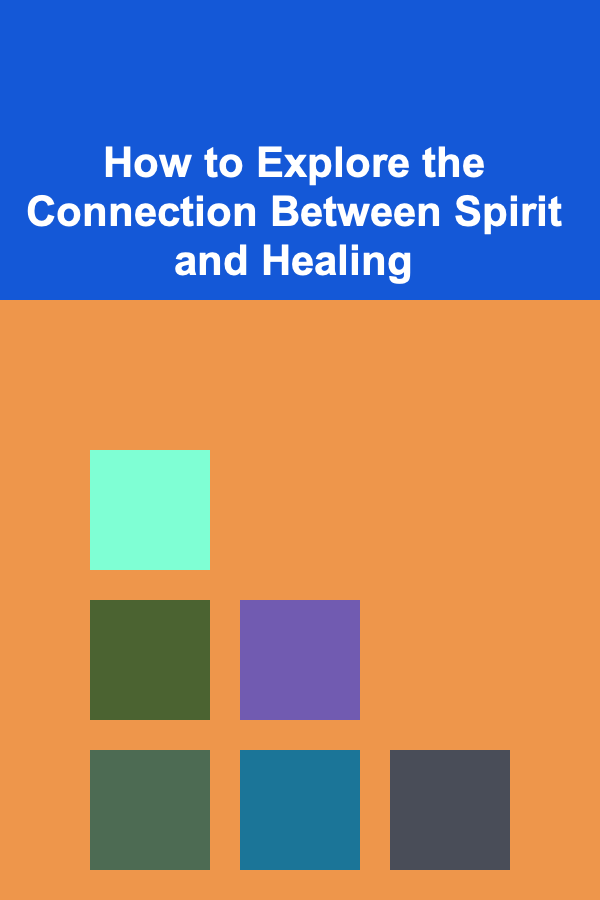
How to Explore the Connection Between Spirit and Healing
ebook include PDF & Audio bundle (Micro Guide)
$12.99$6.99
Limited Time Offer! Order within the next:

Healing is a multifaceted process that involves the physical, emotional, mental, and spiritual realms of a person's existence. While conventional medicine often emphasizes the body and the mind, a growing body of research and personal testimonies suggests that the spirit plays a pivotal role in healing. Whether you view "spirit" as the essence of life, energy, or consciousness, it is increasingly recognized as an essential component in the overall healing process. This article delves into the profound connection between spirit and healing, exploring how spiritual practices, beliefs, and experiences can influence and accelerate healing processes.
Understanding the Spirit
The concept of "spirit" is elusive and has been interpreted in various ways across cultures, religions, and philosophies. For some, spirit is synonymous with soul, representing the eternal, unchanging aspect of a person. For others, it is seen as a dynamic life force or energy that permeates the body, mind, and the universe.
In many spiritual traditions, the spirit is considered the core of a person's being. It is believed to be the source of vitality, consciousness, and the connection to something greater than oneself. This belief is not confined to any one religion or worldview; many ancient healing systems, such as Traditional Chinese Medicine (TCM), Ayurveda, and indigenous healing practices, recognize that the health of the spirit influences the health of the body and mind.
In these traditions, the balance of spiritual energy is seen as crucial for overall well-being. When the spirit is harmonious and aligned with the body and mind, health and vitality are maintained. Conversely, when there is spiritual imbalance, illness can manifest in physical, mental, or emotional forms.
The Role of Spirit in Healing
The connection between spirit and healing is complex, but it can be understood through several perspectives. Whether you approach it from a psychological, energetic, or religious point of view, the spirit is a critical force that impacts the healing process.
1. Energy and Vibration: A Vital Force
One of the most popular modern frameworks for understanding the spirit's role in healing comes from the concept of energy. According to this view, everything in the universe, including the human body, is composed of energy vibrating at different frequencies. When the energy or vibration of the body is disrupted---due to physical illness, emotional trauma, or spiritual disconnection---it can lead to disease and suffering.
Healing, in this context, is a process of restoring balance to the body's energy. Spiritual practices such as meditation, Reiki, acupuncture, and yoga are designed to help realign the body's energy system, allowing for healing at both the physical and spiritual levels.
Practices such as Reiki focus on channeling energy through the healer to the patient, facilitating the flow of energy and stimulating the body's natural healing abilities. Similarly, acupuncture works with the concept of chi, or life force energy, to remove blockages and encourage the body's self-healing processes. These methods often report profound results, as they treat the root energetic imbalances that can lead to physical and emotional distress.
2. Mind-Body-Spirit Connection
The connection between spirit and healing is often described through the mind-body-spirit triad. The mind, body, and spirit are seen as interconnected elements that together form the complete person. When one of these elements is out of balance, the others suffer.
From this perspective, the health of the spirit is integral to the healing of the body and mind. For instance, chronic stress or negative emotional states can manifest as physical ailments, such as headaches, digestive issues, or fatigue. Similarly, unresolved trauma or a lack of spiritual fulfillment can lead to depression, anxiety, or feelings of emptiness.
Healing involves integrating the mind, body, and spirit, which means not only addressing physical symptoms but also emotional wounds and spiritual disconnects. Practices like psychotherapy, energy healing, and spiritual counseling are often used to facilitate this process of integration.
3. Emotional and Spiritual Resilience
Spirituality has long been associated with emotional resilience. Spiritual practices, particularly those rooted in mindfulness and meditation, have been shown to help individuals cope with stress, anxiety, and trauma. These practices foster a sense of inner peace, grounding, and acceptance, which are essential for emotional healing.
Research into the mind-body connection suggests that people who have strong spiritual beliefs or engage in spiritual practices tend to have better mental health outcomes. A deep sense of spiritual connection can provide individuals with the strength to face adversity, endure pain, and heal from trauma.
Furthermore, spiritual resilience is often linked to a sense of purpose or meaning in life. People who feel that their lives have purpose---whether through religion, service to others, or personal growth---tend to experience less psychological distress and recover more quickly from illness. This sense of purpose provides a strong spiritual foundation that can support physical healing.
4. The Placebo Effect: Spirituality and the Power of Belief
One of the most fascinating phenomena related to the connection between spirit and healing is the placebo effect. Studies have shown that when patients believe they are receiving treatment---even if the treatment is inert---many experience actual improvements in their condition. The power of belief is a testament to the mind's influence over the body.
The placebo effect underscores the importance of a person's spiritual beliefs, mindset, and expectations in the healing process. If an individual believes that their spiritual practices or religious rituals will bring about healing, their belief itself can activate healing responses within the body. This reinforces the idea that the spirit---whether through faith, hope, or intention---can play a critical role in overcoming illness.
5. Spiritual Practices for Healing
There are a variety of spiritual practices that can facilitate healing on multiple levels. Below are some of the most commonly practiced methods:
Meditation and Mindfulness
Meditation is one of the most powerful tools for spiritual healing. It encourages a state of deep relaxation and focus, allowing the individual to reconnect with their inner self. Mindfulness meditation, in particular, helps individuals cultivate awareness of their thoughts, emotions, and sensations, fostering a deep sense of presence and peace.
Through regular meditation, individuals can release negative emotions, reduce stress, and promote healing. Studies have shown that mindfulness practices can reduce symptoms of anxiety, depression, and chronic pain, demonstrating the mind-body connection's power in the healing process.
Prayer and Rituals
For many people, prayer is a vital aspect of their spiritual healing journey. Prayer provides an opportunity for individuals to express their fears, hopes, and gratitude, which can be therapeutic in itself. Whether through prayer for strength, healing, or guidance, spiritual seekers often experience a sense of comfort and connection to a higher power.
In addition to prayer, rituals and ceremonies are also powerful healing practices. These rituals often include symbolic acts such as lighting candles, offering incense, or performing specific movements. These acts help individuals feel a sense of control, clarity, and connection to something greater than themselves, thus promoting emotional and spiritual healing.
Energy Healing
Energy healing modalities such as Reiki, acupuncture, and Qi Gong focus on restoring balance to the body's energy field. By channeling energy or manipulating energy points, these practices aim to clear blockages and promote healing. Many practitioners believe that energy healing taps into the universal life force or spirit, which can facilitate physical, emotional, and spiritual restoration.
Sound Therapy and Vibrational Healing
Sound therapy is based on the principle that everything vibrates at its own frequency, including the human body. By using sound waves, either through singing bowls, gongs, or tuning forks, practitioners can influence the vibrational frequency of the body, promoting healing and balance.
This approach is rooted in the belief that certain sounds can stimulate the body's healing mechanisms, activate spiritual energy, and foster deep relaxation. Sound healing has been used to treat a variety of ailments, from stress and anxiety to chronic pain and insomnia.
6. The Power of Connection and Community
Another important aspect of spiritual healing is the role of connection---both to others and to a greater sense of purpose. Many healing traditions emphasize the importance of community support during times of illness or distress. Whether through group prayer, meditation circles, or spiritual healing circles, the collective energy of a group can amplify the healing process.
In many traditions, healing is not just an individual journey but a communal one. Supporting others through their healing process, or receiving support from a community, creates an environment of love, empathy, and collective healing.
Conclusion
The connection between spirit and healing is undeniable, whether understood through the lens of energy, belief, or emotional resilience. The spirit plays a crucial role in the healing process, influencing not only our mental and emotional well-being but also our physical health. Practices like meditation, prayer, energy healing, and ritual provide individuals with the tools to heal on a deeper level, addressing the root causes of illness and imbalance.
As we continue to explore the intricate relationship between spirit and healing, it becomes clear that spiritual well-being is an integral part of overall health. By nurturing the spirit and embracing spiritual practices, we can support the body and mind in their quest for healing, balance, and vitality.
Reading More From Our Other Websites
- [Organization Tip 101] How to Set Up a Craft Swap with Other Parents
- [Home Pet Care 101] How to Take Care of Your Cat's Teeth at Home
- [Home Family Activity 101] How to Build a Family Vision Board Together
- [Organization Tip 101] How to Choose the Best Solar Panel DIY Kit for Your Home
- [Home Staging 101] How to Use Mirrors to Make Small Spaces Feel Larger
- [Organization Tip 101] How to Use Smart Home Technology for Enhanced Security
- [Hiking with Kids Tip 101] Layer Up: The Ultimate Guide to Dressing Kids for Safe and Fun Hikes
- [Home Soundproofing 101] How to Identify and Fix Noise Problems in Older Homes
- [Home Budget 101] How to Make the Most of Your Home Budget During Tough Times
- [Home Pet Care 101] How to Pack a Perfect Pet Travel Essentials Kit: Road Trip Ready!

How to Make Money Online as a Remote Technical Support Specialist
Read More
How to Make the Most of Underutilized Corners
Read More
How to Market Your Translation Services on Social Media: An Actionable Guide
Read More
How to Use Lighting to Make Your Home More Pet-Friendly
Read More
The Art of Recruiting: Strategies for Identifying and Attracting Top Talent
Read More
How to Overcome Procrastination Forever
Read MoreOther Products

How to Make Money Online as a Remote Technical Support Specialist
Read More
How to Make the Most of Underutilized Corners
Read More
How to Market Your Translation Services on Social Media: An Actionable Guide
Read More
How to Use Lighting to Make Your Home More Pet-Friendly
Read More
The Art of Recruiting: Strategies for Identifying and Attracting Top Talent
Read More